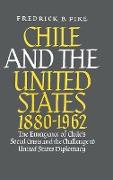- Start
- Chile and the United States 1880-1962
Chile and the United States 1880-1962
Angebote / Angebote:
The key to the future of the United States relations with its sister republics in South and Central America may well be found in this exhaustive study of Chile-United States relationships. The South American nation's relatively small population belies the powerful influence it wields in all American Hemisphere councils.For more than a century a small and tightly-knit group of upper and middle social sectors, representing a fairly broad cross-section of functional interest groups, has controlled the country's destiny. From 1880 to 1933 the course they followed led to many abrasive diplomatic incidents with the great "Colossus of the North." By no means can the blame for these clashes be placed exclusively on Chile's doorstep. Yet, while the diplomatic tangle has been largely unraveled since 1933, the intervening years have served only to expose a far more serious and sensitive source of trouble between the two nations: the wide gulf that separates the governed and the governing in Chile.The two problems, as Professor Pike points out, are inextricably interwoven. It has been a case of a participating, privileged minority served by a nonparticipating, nonprivileged majority. But the difference today is that the formerly docile masses are growing restless.The United States has contributed significantly, even if indirectly to Chile's present social unrest. The material aspects of the American "way of life" expounded and exemplified by United States tourists, missionaries, businessmen, and movies have fired the Chilean people with a desire to attain them. The semi-feudal political, social, and economic order created by the Chilean ruling class perches atop a powder keg, the detonation of which could well pave the way for a dictatorship of the proletariat.The stake of the United States in this gathering crisis is clear. President Kennedy's establishment of the Alliance for Progress in 1961 indicates that the United States has at last officially recognized the gravity of the internal social problem, not only in Chile but throughout the Southern Americas. The program is premised on the belief that Latin-American governments can be pressured into internal reforms by making future aid and loans dependent upon their adoption, and that, form the opposite end of the social spectrum, so to speak, the nonprivileged, nonparticipating majorities cancan be trained to assume their new and rightful place in a democratic society on an intelligent and peaceful basis.The author abundantly documents the reasons underlying the basic Chilean distrust of the United States. Yet at the same time he points to the outmoded opinions of modern United States attitudes and policies stubbornly held by the people of Chile on every level. The righting of this distorted United States image is part of the task of the Alliance for Progress and the Peace Corps, and for this reason among others, the importance of their assignments is impossible to overestimate. The final decision, of course, will be Chile's. Professor Pike's presentation will enable readers to form a balanced opinion of the proper course to pursue.
Folgt in ca. 15 Arbeitstagen
